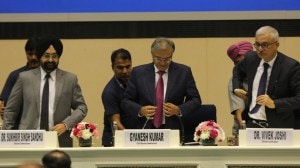Privatisation is the buzzword of military
BANGALORE July 18: Fifty years after the country attained freedom, defence personnel say they are fighting a ``systematic rot'' in their im...

BANGALORE July 18: Fifty years after the country attained freedom, defence personnel say they are fighting a “systematic rot” in their image fostered by public cynicism and political meddling.
Authorities at the Defence Services Staff College, Wellington – the premier national institute for training officers of the combined defence services – are debating on a radical shift from the “glorious isolation” of the past which kept them away from the social mainstream.
“The interaction of defence services with society and media was not calibrated as it is in the west,” said senior defence officials grappling with what they call “the growing indifference of the public to the defence forces”.
They believe that the peace which prevailed in the last 25 years has altered their position in the eyes of the public. Now, at pains to defend themselves from the incorrect public impression of military officials being “nut cases”, plans are afoot to make defence services people friendly and the service economically viable.
“We believe that the infrastructure at our disposal should be used for commercial purposes … like running a five star hotel or any other facilities which would bring better interaction and rake in income.
It’s happening in China and Russia,”said a senior official who preferred not to be named.
Though a section of the services are against changes in the existing order, reality is slowly sinking in that major reforms are long overdue. “With the change in threat perceptions, people, especially south Indians, are turning apathetic to the armed services and its infrastructure,” said the officials who are gearing up for the Golden Jubilee Celebrations of the prestigious college.
Privatisation of the massive military infrastructure, authorities believe, would be a logical culmination. Privatisation has already set in for the manufacturing of military equipment. “Creating new infrastructure for defence manufacturing is being discouraged.
If you look at the missile components being developed, the involvement of the private sector is obvious. So is the case in air-conditioning of the naval ships which is now in the hands of Kirloskars,” said a senior officer.
But what’s troubling the defence headquarters is the acute lack of middle and upper middle officer cadre. “There is a critical shortage,” agreed the officials.
The shortage, they say, is mainly due to the lack of interest in military jobs and exodus of the existing staff to greener pastures. “We still get many applications. But they don’t meet our criteria,” he added. But the officials here say the bottomline is safe, thanks to rising unemployment in the country.



- 01
- 02
- 03
- 04
- 05




























